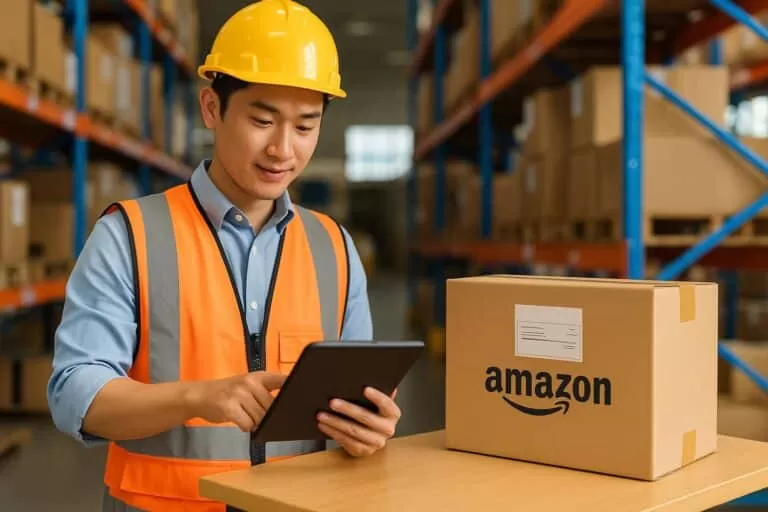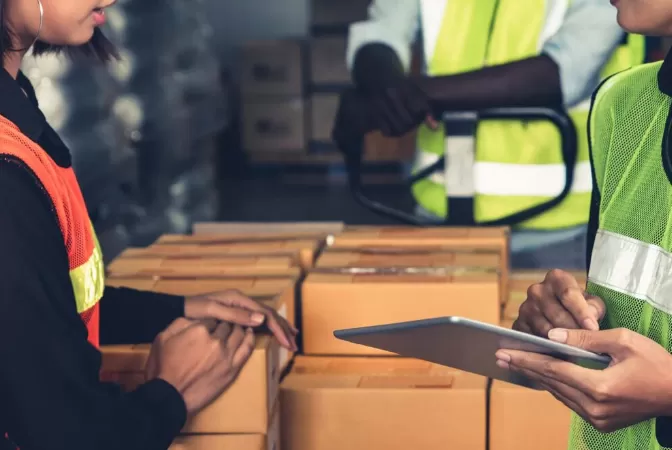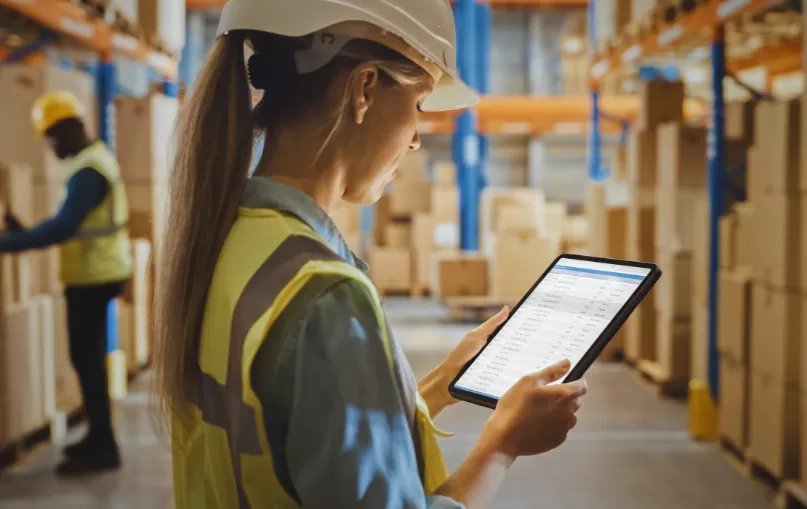Let's be blunt. When you're searching for a "How to Pick a Freight Forwarder for Amazon FBA," you're not actually looking for the lowest number on a quote. You're searching for a partner who won't get your shipment stuck in customs, won't drown you in hidden fees, and will deliver your inventory on time so you don't face stockouts.
The truth is, the cheapest option can be the most expensive mistake you ever make. This guide isn't about finding the bottom-dollar provider Shipping from China to the United States; it's about finding the right partner who offers the best value—where reliability and cost meet. We'll give you the framework, the questions to ask, and a powerful tool to make you an expert in selecting your The Definitive Guide to Vetting Amazon FBA Freight Forwarders.
Why the Cheapest Quote is Often a Trap
Think of your freight quote like an iceberg. The number you see first is just the tip. Below the surface lurks a mass of potential additional charges that can sink your profitability. A forwarder might win your business with a lowball ocean freight rate, only to hit you with exorbitant "destination charges" that they conveniently omitted initially.
The Real Cost of a Stockout: Let's do the math. If that "cheap" forwarder's shipment is delayed by two weeks, causing your best-selling product to go out of stock, what's the real cost? Lost sales, diminished Amazon SEO ranking, and potential lost Buy Box percentage. That "savings" on freight evaporates instantly.
The True Cost Components (The Iceberg Analogy):
The Tip (The Quote): Ocean Freight/Air Freight rate.
Below the Surface (The Real Cost):
Fuel & Currency Surcharges (BAF, CAF): Fluctuating fees that reputable forwarders are transparent about.
Origin Charges: Terminal Handling, Documentation Fee, Export Customs Clearance.
Destination Charges (The Danger Zone): This is where hidden fees live. This includes:
Customs Clearance & Brokerage Fees: Is this included? At what rate?
Bond Fees: Both Single Entry and Continuous Bonds are required for US imports.
ISF/AMS Filing Fees: Mandatory for US imports; failing to file correctly results in massive fines.
Port Handling & Pier Charges: Fees for moving your container from the ship to the yard.
Drayage (Trucking): The cost to move your container from the port to the Amazon Fulfillment Center. This includes the crucial Amazon Appointment Fee.
Storage & Demurrage/Detention: Fees incurred if your cargo sits at the port or if the container isn't returned on time. A "slow" forwarder can cause these costs to rack up.
The Takeaway: "Cheap" is a function of Total Landed Cost and Reliability. Your goal is to find a forwarder who provides a comprehensive, all-inclusive quote (preferably on a DDP - Delivered Duty Paid basis) and has a track record of on-time deliveries.
Real-World Cost Snapshot: 2CBM / 200kg from Shenzhen to LA Amazon FC
Let's put theory into practice. Below is a simplified comparison for a typical LCL shipment. Note: These are estimates based on Q3 2024 market rates and will vary. The key is the dramatic difference in cost structure.
| Shipping Method |
Sea Freight (LCL) |
Air Freight |
International Express |
| Quoted Freight Cost |
$45/CBM ($90) |
$6.5/kg ($1,300) |
$8.5/kg ($1,700) |
| Estimated Surcharges (Fuel, Admin, etc.) |
$80 |
$150 |
Included |
| Estimated Destination Charges (Clearance, Trucking, Taxes, etc.) |
$550 - $750 |
$400 - $550 |
$150 - $250 (Often largely included) |
| Total Estimated Cost |
$720 - $920 |
$1,850 - $2,000 |
$1,850 - $1,950 |
| Estimated Transit Time |
30-40 days |
8-12 days |
5-7 days |
| Best Suited For |
Cost-sensitive, well-planned, non-seasonal goods |
Inventory replenishment, mid-to-high value goods, testing new products |
Emergency stock replenishment, small, high-value samples |
Key Takeaway: For sea freight, destination charges can be 6-8 times the base ocean freight cost! This is precisely why you must insist on an all-inclusive (DDP) quote.
Step 1: The Initial Screening – The 5 Must-Ask Questions
Before you even request a formal quote, screen potential forwarders with these calls or emails. Their answers will tell you everything about their professionalism and FBA expertise.
"What is your experience with Amazon FBA-specific requirements?" Listen for specifics: palletization standards, FBA labeling, shipment plan creation in Seller Central, and experience with your target FCs.
"Can you provide a detailed, all-inclusive DDP quote to the Amazon FC?" This forces transparency from the start.
"Who handles customs clearance at destination, and is it included in the quote?" The answer should be "we do, and yes, it's included." If they outsource it or it's extra, proceed with caution.
"What is your process for cargo tracking and communication?" You want a dedicated point of contact and a proactive tracking system, not just a container number to track yourself.
"Can you share a reference or case study from a similar Amazon seller?" A confident forwarder will have these ready.
Step 2: The Quote Analysis – Your Secret Weapon
This is the core of your vetting process. Do not compare PDFs that all look different. Force them onto your own playing field.
We've created a free, downloadable Amazon FBA Shipping from China to the United States Freight Quote Comparison Template]. Use it to standardize the data you receive.
| Cost Item |
Forwarder A |
Forwarder B |
Forwarder C |
Notes |
| Origin Charges |
|
|
|
Are these clearly broken out? |
| - Ocean Freight (per CBM) |
$XXX |
$XXX |
$XXX |
|
| - Documentation Fee |
$XX |
$XX |
$XXX |
Why is C higher? |
| - Export Customs |
Included |
$XX |
Included |
|
| Destination (DDP) Charges |
|
|
|
CRITICAL SECTION |
| - Customs Clearance |
Included |
$150 |
Included |
|
| - HS Code Classification |
Included |
$75 |
Included |
B is charging extra for this? |
| - Duty & Tax Estimate |
$XXX |
$XXX |
$XXX |
This should be an estimate |
| - Port Fees & Drayage |
$XXX |
$XXX |
$XXX |
To Amazon's door |
| Insurance |
0.3% of value |
0.25% of value |
Not Included |
Always get insurance! |
| TOTAL ESTIMATED COST |
$X,XXX |
$X,XXX |
$X,XXX |
|
| Quoted Transit Time |
35 days |
28 days |
40 days |
|
| Payment Terms |
50% deposit |
100% upfront |
30 days credit |
*C offers net-30? Interesting.* |
By forcing this comparison, you move beyond price to value. Why is Forwarder B cheaper but charging for basic services? Why is Forwarder C slower but offering better payment terms? This tool empowers your decision.
The FBA Expertise Interrogation
A general freight forwarder can move a box. An FBA expert ensures that box seamlessly enters Amazon's ecosystem.
Ask about Labeling: "What is your process if my FBA labels are smudged or damaged during transit?" A great forwarder will have a contingency plan, like re-labeling services at a destination warehouse.
Ask about Carton Content Labels: "Do you understand Amazon's requirements for carton content labels for LCL shipments?" Their answer will immediately reveal their level of detail-orientation.
Ask about Amazon's Latest Requirements: "How do you stay updated with changes to Amazon's FBA packaging and prep requirements?" They should mention partnerships, direct communication with Amazon, or dedicated training.
The Communication & Transparency Checklist
Proactive Updates: You shouldn't have to chase them. They should provide a schedule and stick to it: confirmation of booking, gate-in at port, departure, arrival, customs clearance, and final delivery.
Problem Resolution: Ask, "Can you walk me through what happens if there's a FBA Customs Clearance Agent or a missed Amazon appointment?" Their process should be clear, communicated upfront, and focused on solutions.
Contract Clauses You Must Understand
Before signing, scrutinize these areas in the service agreement:
Liability for Delays: What constitutes a "delay"? Is there any compensation (e.g., a discount) for missing the estimated transit time by a significant margin? Most contracts limit liability, but it's a key question to ask.
Force Majeure: How are events like strikes, port closures, or extreme weather handled? Understand that while these may exempt the forwarder from penalties, a good partner will still communicate and mitigate.
Scope of Service: Does the contract explicitly list all services included (e.g., "customs clearance using our licensed broker," "drayage to Amazon ONT8")? Vague language leads to extra charges.
Claims Process for Insurance/Cargo Damage: How long do you have to file a claim? What documentation is required? A clear process is a sign of a professional operation.
freight forwarding
Get real-time quotes for
Get Quotes
FAQ: Clearing the Common Hurdles
Q: What is the absolute cheapest way to ship for FBA?
A: For non-urgent, high-volume goods, Full Container Load (FCL) ocean freight is typically the lowest cost per unit. For smaller quantities, Less than Container Load (LCL) consolidates your cargo with others. However, always factor in the holding costs at Amazon and the risk of slower transit times. "Cheap" is a balance.
Q: Is freight insurance necessary? I want to save money.
A: Yes. Always. It's a small percentage of your cargo's value (often 0.2%-0.5%) that protects you from total loss (e.g., ship fires, container lost at sea) or major damage. Skipping insurance is one of the biggest false economies in international shipping.
Q: DDP vs. DDU – which is better for Amazon FBA sellers?
A: Differences between DAP and DDP is almost always the better choice, especially for newer importers. The freight forwarder takes responsibility for all costs and risks to deliver your goods to Amazon. With DDU (Delivered Duty Unpaid), you, the seller, are responsible for paying duties and taxes upon arrival, which adds complexity and potential for unexpected bills and delays.
Q: I'm sourcing from Vietnam/India to diversify. Are there major differences?
A: Yes. While the overall process is similar, key differences exist. Vietnam has rapidly developing port infrastructure, but forwarder expertise there can be less mature than in China. Ensure your forwarder has a strong local team. India's export documentation and customs procedures can be more complex. You need a forwarder with deep local knowledge to avoid bureaucratic delays. The core principle remains: vet their local expertise intensely.
Q: My product is oversized (e.g., furniture) or heavy. What should I look for?
A: For non-standard cargo, the "cheapest" forwarder is often ill-equipped. You need a specialist. Key questions become:
Equipment & Handling: Do they have experience with flat-rack or open-top containers? Can they handle the loading/unloading safely?
Routing & Access: Will the final trucking route accommodate the size/weight to the Amazon FC?
Crating Requirements: They must advise on export-grade crating to prevent damage. In these cases, expertise trumps a minimal price difference.
Q: What happens if my goods are held by customs? What is the forwarder's responsibility?
A: This is a critical question. A professional forwarder's responsibility is to act as your agent and manage the clearance process. This means their licensed customs broker will communicate with customs authorities, provide any requested documentation, and work to resolve the issue. However, the root cause of the hold determines the cost. If the hold is due to the forwarder's error (e.g., incorrect paperwork they prepared), they should cover the costs. If it's due to your product's classification, missing certificates, or FDA/etc. issues, you will likely bear any resulting demurrage or additional handling fees. A great forwarder will be transparent about this distinction from the start.
Q: Are there risks with LCL (Less than Container Load) shipments that I don't have with a full container?
A: Yes, primarily two key risks:
Contamination & Delays: Your goods share a container with other shippers' cargo. If one shipper's goods are improperly declared (e.g., hazardous materials without documentation) or have pests, the entire container can be held up or inspected, delaying your shipment. A reputable forwarder mitigates this by carefully vetting and consolidating compatible cargo.
Cargo Damage: Increased handling at the consolidation and deconsolidation warehouses slightly increases the risk of damage compared to an FCL shipment, which is sealed at origin and only opened at destination. Proper packaging and insurance are essential.
Q: What's the difference between a freight forwarder offering "net 30 terms" and one requiring full payment upfront? Does it matter?
A: It can matter significantly for your cash flow. "Net 30" means you have 30 days after the service is completed (or invoice is issued) to pay. This allows you to use the freight service without immediate cash outlay, which is helpful for managing budgets. Forwarders who offer this are typically larger, more established, and confident in their financial stability. Requiring payment upfront is common, especially for smaller forwarders or new clients, but it puts the financial burden on you first. It's not necessarily a red flag, but favorable payment terms are a sign of a strong, trustworthy partner.
Q: For air freight, what is the difference between "consolidated air freight" and a direct charter? Which one is referred to as "cheap air freight"?
A: When people search for "What's the Cheapest Way to Ship from China," they are almost always referring to consolidated air freight. Here's the difference:
Consolidated Air Freight: Your goods are grouped with other shipments to fill a pallet or an entire aircraft. The forwarder buys space in bulk and offers you a lower rate for your portion. This is the standard, most cost-effective method for most Amazon shipments and has transit times of 8-12 days.
Direct Charter: You pay to rent an entire aircraft for your goods alone. This is extremely fast but prohibitively expensive, used only for emergency situations or massive, high-value shipments. It is not relevant for the vast majority of sellers searching for "cheap" options.
Q: How can I verify a freight forwarder's claims about their licenses and certifications?
A: This is an excellent due diligence question. For US-bound freight, you can and should verify two key things:
Customs Broker License: Ask for their customs broker license number. You can verify the status of an individual broker's license through the U.S. Customs and Border Protection (CBP) license search page.
FF (The Ultimate Guide to Choosing a Freight Forwarder) Number: A legitimate forwarder will have an FF number issued by the Federal Maritime Commission (FMC) if they handle ocean freight. You can search for this on the FMC website. While not a guarantee of quality, it confirms they are a recognized entity subject to regulation. Asking for these details separates serious professionals from less reputable operators.

 EN
EN
 FR
FR
 ES
ES
 JA
JA
 PT
PT
 RU
RU
 AR
AR







